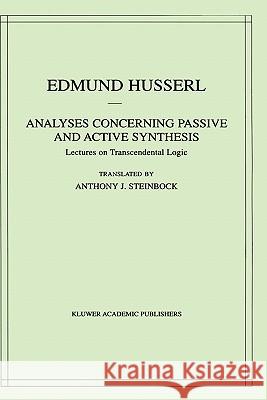Analyses Concerning Passive and Active Synthesis: Lectures on Transcendental Logic » książka
Analyses Concerning Passive and Active Synthesis: Lectures on Transcendental Logic
ISBN-13: 9780792370659 / Angielski / Twarda / 2001 / 661 str.
Coming from what is arguably the most productive period of Husserl's life, this volume offers the reader a first translation into English of Husserl's renowned lectures on passive synthesis', given between 1920 and 1926. These lectures are the first extensive application of Husserl's newly developed genetic phenomenology to perceptual experience and to the way in which it is connected to judgments and cognition. They include an historical reflection on the crisis of contemporary thought and human spirit, provide an archaeology of experience by questioning back into sedimented layers of meaning, and sketch the genealogy of judgment in active synthesis'.
Drawing upon everyday events and personal experiences, the Analyses are marked by a patient attention to the subtle emergence of sense in our lives. By advancing a phenomenology of association that treats such phenomena as bodily kinaesthesis, temporal genesis, habit, affection, attention, motivation, and the unconscious, Husserl explores the cognitive dimensions of the body in its affectively significant surroundings. An elaboration of these diverse modes of evidence and their modalizations (transcendental aesthetic), allows Husserl to trace the origin of truth up to judicative achievements (transcendental logic).
Joined by several of Husserl's essays on static and genetic method, the Analyses afford a richness of description unequalled by the majority of Husserl's works available to English readers. Students of phenomenology and of Husserl's thought will find this an indispensable work.











